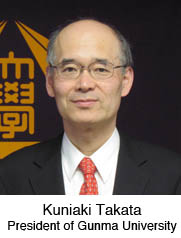Establishing an advanced research center for young scientists

The Global COE program titled “The comprehensive study on biological regulation signals,” which was adopted in fiscal 2007, inherits the 21st century COE program titled “The reception and transmission of biological information, and the expression of functions,” which was conducted from fiscal 2002 to fiscal 2006, in a new and advanced form. This time, Akita University has joined the Gunma University, Graduate School of Medicine and Institute for Molecular and Cellular Regulation, to renovate the program, which, I hope, will provide the project with the synergic effects.
In the Global COE program, we are expected to perform advanced research at the global level, and to establish the foothold for training young researchers who will be triggered for the further advance of sophisticated research. In other words, it is our duty to enrich graduate school.
Our Graduate School of Medicine was reorganized in fiscal 2003, based on Faculty of Medicine and its affiliated hospital. We sloughed off the conventional framework composed of basic medicine (physiology and pathology), clinical medicine (surgery and internal medicine) and social medicine, and established the new system comprising of 4 divisions (Divisions of Neurosciences, Bioregulatory Medicine, Biosystem Medicine, Environmental Medicine) by fusing basic medicine and clinical medicine from a new perspective. Each division comprises of two subdivisions accompanied by cooperative and/or collaborative subudivisions form Institute for Molecular and Cellular Regulation and Takasaki Advanced Radiation Research Institute, Japan Atomic Energy Agency. We believe that the new division system serves a key role in facilitating advanced medical research and education for the new era. In this system, researchers in a broad spectrum of basic and clinical medicine cooperate with one another to carry out studies on various diseases and phenomena through basic analysis to clinical application seamlessly.
In order to train graduate students systematically, we established “Education and Research Center”, exclusively dedicated to graduate education, and appointed an associate professor and 6 assistant professors on a full-time basis, who conduct laboratory courses for fundamental and basic techniques for experiment, cell culture, gene analysis, protein expression, and laboratory animal, and protein chemistry. This center also serves in coordinating graduate education, such as the assistance in graduate students’ symposium planning and presentation. The Global COE program will help graduate students who have learned the fundamentals of experiment to further pursue more advanced world-class research.
The Graduate School of Medicine deals with not only the present Global COE program but also the other advamced programs, including the 21st century COE titled “Medical and biological research based on the accelerator technology” (fiscal 2004-2008). This program constitutes the core basic research for the heavy ion irradiation facility for cancer treatment, which is under construction in our campus. Other programs includes the program for developing cancer treatment professionals titled “The collaborative plan in the Northern Kanto Area for training professionals for advanced cancer treatment—aiming at developing and diffusing multidisciplinary cancer therapy using the heavy ion irradiation device” (fiscal 2007-2011). We hope that many young people will join our graduate school and carry out advanced research under the Global COE and other advanced program.